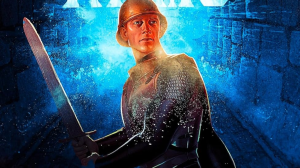HBO’s Chernobyl miniseries may have told a true story — that of the catastrophic 1986 nuclear disaster at the Chernobyl Nuclear Power Plant in the then-Soviet Ukraine — but as with any historical event, there are versions of the story that are more dramatic than others. In the case of Chernobyl, that is especially true thanks to not just the horror of what happened at Chernobyl, but the sensationalized accounts of some of the genuine accounts as well. For series creator Craig Mazin, it was important to tell the “less dramatic” version of events in order to tell a more authentic story.
Videos by ComicBook.com
In an interview with Vox, Mazin explained that part of putting Chernobyl together involved choosing stories whose aspects were largely agreed upon and then choosing the less sensational versions.
“It became clear that there were certain aspects of the story that everyone agreed on,” Mazin explained. “And those stories struck me as terrifying and shocking. From that point forward, if there was a conflict, I would go with the less dramatic, and the less shocking, less sensationalist versions, because I had enough. And every time you nudge things to make yourself look better, you are threatening to undermine the entire thing.
So when I had a choice, I went for the less dramatic version. We’re dealing with a largely oral history. There’s a lot of written material, but the written material occasionally disagrees with itself. It’s a story that took place in a closed society. There’s a lot of challenges there.”
And when it came to stories disagreeing with themselves, there was one specific moment in the Chernobyl story that changed dramatically from script to shooting — the story of the three divers who went into the basement of reactor No. 4 to drain the highly radioactive water and prevent an explosion. Mazin explained that most accounts of the real-life divers had a tragic end — one that turned out to be very different, and a bit less dramatic, than reality.
“Up until six months before shooting, the story that I had seen everywhere, and which was repeated not only in news articles but in many reputable books, was that those three men went into the water, they were completely submerged, so they were scuba diving through total water, and they died two weeks later,” Mazin said. “And that is a hell of a story. It certainly makes that moment and that sacrifice just all the more gut-wrenching.
But about six months before shooting, as I was still working on the scripts and researching, I read a book called 01:23:40 by a guy named Andrew Leatherbarrow; he’s sort of an amateur Chernobylologist, and he wrote a terrific book [that contained the same story as it had previously been told]. Then he changed it because he had done further research, and according to his research, he had discovered that, in fact, those guys didn’t die. And they weren’t submerged completely in water, and two of them are still alive today.”
The realization that the less dramatic story — that of the divers surviving — was ultimately the story the series told, one that Mazin said he was glad to help set the record straight on.
“And look, I could have made an incredibly good case to just leave it as it was. I had 99 sources saying they were dead and one saying they were alive. I went with the alive one, which by the way is correct, and I’m actually happy to help set the record straight about that, and that they weren’t completely submerged.”
Did you watch be HBO’s Chernobyl? Let us know in the comments below.








